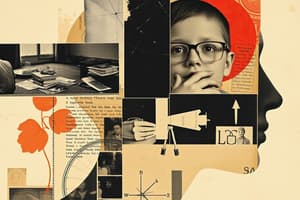Podcast
Questions and Answers
Which type of memory is specifically associated with dated events that are part of a person's life story?
Which type of memory is specifically associated with dated events that are part of a person's life story?
- Episodic memory (correct)
- Autobiographical memory
- Flashbulb memory
- Semantic memory
Eyewitness testimony errors are categorized under which practical consequence of memory errors?
Eyewitness testimony errors are categorized under which practical consequence of memory errors?
- Memory for traumatic events
- Practical consequences (correct)
- Inferred memories
- False memories
What is the key characteristic of autobiographical memories as defined by Rubin (2005)?
What is the key characteristic of autobiographical memories as defined by Rubin (2005)?
- They are exclusively composed of episodic memories.
- They are recollections of events that belong to an individual's past. (correct)
- They are primarily focused on semantic knowledge about oneself.
- They are always accurate and detailed records of events.
Which of the following is NOT explicitly classified as a cause of memory errors?
Which of the following is NOT explicitly classified as a cause of memory errors?
When episodic memory fades over time, what type of memory can often remain?
When episodic memory fades over time, what type of memory can often remain?
Which of the following is an example used to illustrate autobiographical memory?
Which of the following is an example used to illustrate autobiographical memory?
What does autobiographical memory encompass?
What does autobiographical memory encompass?
What characterizes the change in memory for distant events as people age?
What characterizes the change in memory for distant events as people age?
According to research, during which life stage is memory typically enhanced for both episodic and semantic facts?
According to research, during which life stage is memory typically enhanced for both episodic and semantic facts?
What does the term 'reminiscence bump' refer to?
What does the term 'reminiscence bump' refer to?
Which of the following is considered an event that people generally remember better from their own lives?
Which of the following is considered an event that people generally remember better from their own lives?
Which hypothesis suggests that memory is enhanced for events that occur when a person's self-image or life identity is being formed?
Which hypothesis suggests that memory is enhanced for events that occur when a person's self-image or life identity is being formed?
According to the cognitive hypothesis, why are memories during the period of the reminiscence bump remembered best?
According to the cognitive hypothesis, why are memories during the period of the reminiscence bump remembered best?
What does the cultural life-script hypothesis propose regarding personal events?
What does the cultural life-script hypothesis propose regarding personal events?
According to the content provided, what assumption do people in this period of age (RB) make about their lifetime?
According to the content provided, what assumption do people in this period of age (RB) make about their lifetime?
From the content provided, approximately how many transitions occur between ages 10 and 30?
From the content provided, approximately how many transitions occur between ages 10 and 30?
According to the provided script examples, which of these actions is LEAST likely to be associated with visiting a dentist?
According to the provided script examples, which of these actions is LEAST likely to be associated with visiting a dentist?
What do the studies suggest about how people use scripts when recalling events?
What do the studies suggest about how people use scripts when recalling events?
If a person recalls having a conversation they didn't actually have, but it aligns with a typical script in that context, which process is likely at fault?
If a person recalls having a conversation they didn't actually have, but it aligns with a typical script in that context, which process is likely at fault?
Based on the script examples, when might someone be most likely to add their own details to an event they are recalling?
Based on the script examples, when might someone be most likely to add their own details to an event they are recalling?
According to the examples, what is a KEY defining characteristic of a 'script' in terms of cognitive memory?
According to the examples, what is a KEY defining characteristic of a 'script' in terms of cognitive memory?
Which term describes the tendency to leave out details when recalling an event?
Which term describes the tendency to leave out details when recalling an event?
What type of memory error involves adding fabricated details to an event during recall?
What type of memory error involves adding fabricated details to an event during recall?
What best describes schemas in the context of memory?
What best describes schemas in the context of memory?
Which of the following is the best example of a 'script'?
Which of the following is the best example of a 'script'?
What role do schemas and scripts play in the formation of false memories?
What role do schemas and scripts play in the formation of false memories?
Which of the following is NOT listed as a reason for making errors in memory construction?
Which of the following is NOT listed as a reason for making errors in memory construction?
In the Brewer & Treyens (1981) study, which of the following contributed the most to false memories?
In the Brewer & Treyens (1981) study, which of the following contributed the most to false memories?
How do 'changes' manifest themselves as an error in memory?
How do 'changes' manifest themselves as an error in memory?
What is the cause of 'inferred memories' according to the text?
What is the cause of 'inferred memories' according to the text?
What best distinguishes a 'script' from a more general 'schema'?
What best distinguishes a 'script' from a more general 'schema'?
What is the core idea behind the constructive approach to memory?
What is the core idea behind the constructive approach to memory?
In Bartlett’s 'war of the ghosts' experiment, what was the primary method used to test memory recall?
In Bartlett’s 'war of the ghosts' experiment, what was the primary method used to test memory recall?
What was the primary source from which the story used in Bartlett’s experiment was taken?
What was the primary source from which the story used in Bartlett’s experiment was taken?
What was one of the most common types of alteration that occurred when participants recalled the 'war of the ghosts' story?
What was one of the most common types of alteration that occurred when participants recalled the 'war of the ghosts' story?
According to the content provided, what is a central component that plays a crucial role in how memories are formed?
According to the content provided, what is a central component that plays a crucial role in how memories are formed?
What does the content suggest about the nature of memory?
What does the content suggest about the nature of memory?
In 'the war of the ghosts' experiment, what happened to the length of the recalled story over time?
In 'the war of the ghosts' experiment, what happened to the length of the recalled story over time?
What does the content indicate about the nature of errors in memory recall?
What does the content indicate about the nature of errors in memory recall?
If a participant from England, with limited exposure to canoes, was involved in Bartlett's study, how might their recall of the word 'canoe' be affected?
If a participant from England, with limited exposure to canoes, was involved in Bartlett's study, how might their recall of the word 'canoe' be affected?
According to the material, which component is NOT explicitly part of the active process of creating memories?
According to the material, which component is NOT explicitly part of the active process of creating memories?
Flashcards
Autobiographical Memory
Autobiographical Memory
Memories of personal events from our past, including details about when and where they occurred.
Inferred Memory
Inferred Memory
A type of memory error where we fill in missing details based on assumptions or general knowledge.
False Memory
False Memory
Memories that are completely false but feel as real as true memories.
Eyewitness Testimony Errors
Eyewitness Testimony Errors
Signup and view all the flashcards
Flashbulb Memories
Flashbulb Memories
Signup and view all the flashcards
Semantic Memory
Semantic Memory
Signup and view all the flashcards
Episodic Memory
Episodic Memory
Signup and view all the flashcards
Reminiscence Bump
Reminiscence Bump
Signup and view all the flashcards
Self-image Hypothesis
Self-image Hypothesis
Signup and view all the flashcards
Cognitive Hypothesis
Cognitive Hypothesis
Signup and view all the flashcards
Cultural Life-Script Hypothesis
Cultural Life-Script Hypothesis
Signup and view all the flashcards
Personal Life Story
Personal Life Story
Signup and view all the flashcards
Cultural Life Script
Cultural Life Script
Signup and view all the flashcards
Schema
Schema
Signup and view all the flashcards
Script
Script
Signup and view all the flashcards
False Memories
False Memories
Signup and view all the flashcards
False Memories and Experience
False Memories and Experience
Signup and view all the flashcards
Personal Bias
Personal Bias
Signup and view all the flashcards
Suggestions and False Memories
Suggestions and False Memories
Signup and view all the flashcards
Brewer & Treyens (1981) Study
Brewer & Treyens (1981) Study
Signup and view all the flashcards
Memory Errors
Memory Errors
Signup and view all the flashcards
Constructive Memory
Constructive Memory
Signup and view all the flashcards
Constructive Nature of Memory
Constructive Nature of Memory
Signup and view all the flashcards
Repeated Reproduction
Repeated Reproduction
Signup and view all the flashcards
Bartlett's "War of the Ghosts" Experiment
Bartlett's "War of the Ghosts" Experiment
Signup and view all the flashcards
Cultural Bias in Memory
Cultural Bias in Memory
Signup and view all the flashcards
Influence of Prior Knowledge on Memory
Influence of Prior Knowledge on Memory
Signup and view all the flashcards
Memory Distortion
Memory Distortion
Signup and view all the flashcards
Culture and Omissions in Memory
Culture and Omissions in Memory
Signup and view all the flashcards
Subjectivity in Memory
Subjectivity in Memory
Signup and view all the flashcards
Reliability of Memory
Reliability of Memory
Signup and view all the flashcards
False Inferred Memories
False Inferred Memories
Signup and view all the flashcards
Bower et al.'s (1979) Dentist Study
Bower et al.'s (1979) Dentist Study
Signup and view all the flashcards
Script-Driven Memory Distortion
Script-Driven Memory Distortion
Signup and view all the flashcards
Scripts' Importance for Memory
Scripts' Importance for Memory
Signup and view all the flashcards
Study Notes
Everyday Memory Errors
- Memory for personal events, including autobiographical memories (events from personal past), episodic memories (dated events in lives), and semantic memories (knowledge about dates, events).
- Autobiographical memory fades over time, becoming more semantic.
- Memory for distant events is more semantic.
- Memories are better for certain points in life, known as the reminiscence bump.
Memory for Personal Events
- The reminiscence bump involves enhanced memory for events from adolescence and young adulthood. It likely stems from a confluence of factors:
- Self-image hypothesis: Memories enhanced when identity is formed.
- Cultural life-script hypothesis: Greater recall of events congruent with cultural expectations.
- Cognitive hypothesis: Memories encoded during periods of rapid change.
- The reminiscence bump is associated with heightened memory for adolescence and young adulthood.
Flashbulb Memories
- Flashbulb memories are vivid and detailed memories of emotionally significant events, such as shocking or life-altering experiences.
- They are not necessarily more accurate but perceived as more detailed, though evidence suggests there's no special mechanism for them.
- Strong emotions enhance memory, evidenced by studies like Hamann et al (1999) using PET scans, showing increased amygdala (emotional processing) activity with emotional stimuli.
- Other studies, such as Cahill et al (1995), found that amygdala damage impairs memory for emotionally charged events.
How Memories Are Constructed
- Memory is considered constructive - a combination of accurate details and personal interpretation, knowledge, experiences and expectations.
- Memories are not exact recordings but are actively constructed, prone to errors.
- Errors can be due to omissions, distortions, or fabrications in the memory reconstructing process,
- Sources of error include schemas (mental frameworks), scripts (expected sequences of actions), personal biases, and suggestions.
- Bartlett's war of the ghosts experiment demonstrates the constructive nature of memory, through repeated reproduction of the story the participants often simplified, changed, or omitted story information.
False Inferred Memories
- False memories arise when knowledge and expectations shape and distort memory. Schemas and scripts lead to expectation-based recall of events, even if not experienced.
- Brewer & Treyens (1981) showed that office schemas cause people to misremember items present in the office.
- Bower et al. (1979) showed that memory for going to the dentist is altered by existing scripts (expectations from a dentist visit).
False Memories Due to Personal Bias
- Memories can be biased by egocentric bias (remembering oneself positively), consistency bias (recalling attitudes aligned with past views), and positive change bias (perceiving things as improving).
False Memories Due to Suggestion
- Memory can be influenced by post-event information (misinformation effect), notably by Loftus and Palmer (1974), with suggestions of events potentially changing or adding details to an original memory experience.
Eyewitness Testimony
- Eyewitness testimony is prone to error due to emotional state, familiarity bias, and suggestions.
- Studies indicate that emotional arousal during events can negatively impact the accuracy of eyewitness testimony.
- Familiarity and existing schemas or learned expectations can also lead people to misidentify familiar people as the culprit (Ross et al., 1994).
- Suggestions or misleading post-event information (e.g., misinformation effect) can alter or distort eyewitness accounts (Loftus & Palmer, 1974; Loftus et al., 1978).
Why Forget?
- Remembering relevant/frequent information aids efficiency and avoids overload.
- This system design prioritizes important and recurring events.
Studying That Suits You
Use AI to generate personalized quizzes and flashcards to suit your learning preferences.




